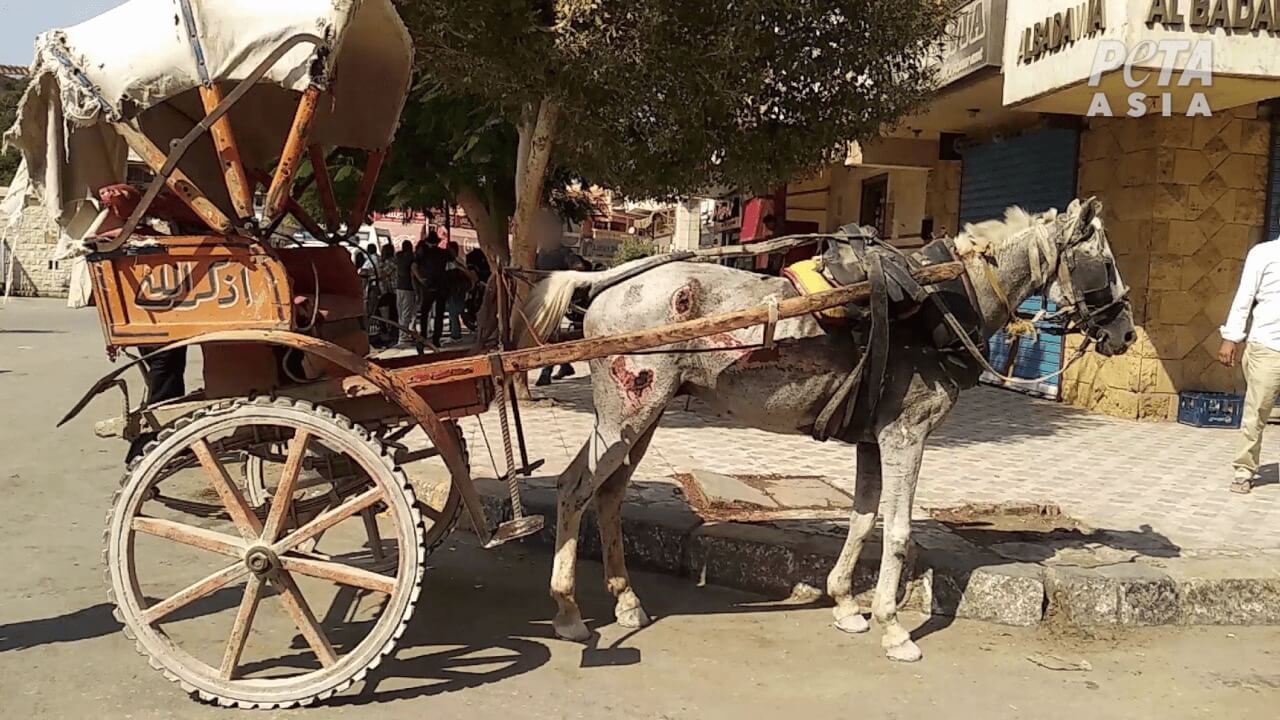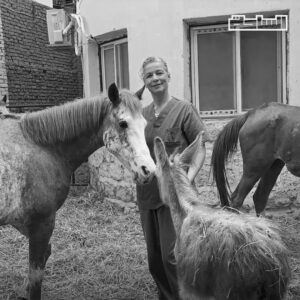Introduction to the Issue of Animal Cruelty
Animal cruelty is a pressing issue that affects various regions worldwide, and Egypt is no exception. In recent years, this country has witnessed a growing awareness regarding the maltreatment of animals. Cultural and societal attitudes towards animals play a significant role in shaping this troubling landscape. Historically, animals in Egypt have often been viewed merely as working entities rather than sentient beings deserving of compassion and care. This perspective has contributed to a widespread normalization of neglect and abuse, with many people unaware of the legal and ethical implications of their actions.
Statistical data highlights the seriousness of the situation. According to a report by the Egyptian Society for Animal Welfare, more than 70% of stray animals in urban areas suffer from malnutrition and untreated diseases. Furthermore, there are numerous accounts of physical abuse, often perpetrated by individuals who perceive animals as mere tools for labor or entertainment. The plight of stray dogs and cats, in particular, serves as a stark reminder of the challenges facing animal welfare in the region. Anecdotal evidence, such as personal testimonies from activists and rescued animals, sheds light on the stark realities of this crisis.
Community attitudes towards animal welfare vary, with some advocates striving to shift perceptions and promote empathetic treatment of all living creatures. Grassroots organizations and volunteers are increasingly working against the tide of apathy to foster better living conditions for neglected and abused animals. However, the prevalence of traditional beliefs and practices continues to undermine these efforts. As discussions around animal rights gain traction, it is crucial to understand and acknowledge the deep-rooted attitudes that perpetuate cruelty and engage in meaningful conversations to foster change.
The Viral Incident Explained
The incident that sparked widespread attention on social media occurred in a bustling public square in Cairo, where a Dutch expat witnessed an alarming act of animal cruelty. The confrontation unfolded one sunny afternoon when the expat noticed an individual mistreating a stray dog, a scenario not uncommon in urban areas of Egypt where stray animals often face harsh treatment. The expat, a passionate advocate for animal rights, was compelled to intervene, highlighting the urgency of addressing such behavior.
As the situation escalated, the Dutch national captured the entire encounter on video, documenting the abuser’s aggressive actions towards the dog. The expat’s quick-thinking approach involved confronting the individual, verbally challenging their actions while simultaneously emphasizing the importance of compassion towards animals. The onlookers, who had initially been passive observers, began to rally around the expat, creating a scene that attracted even more attention. The presence of a foreign national engaging in this confrontation added an interesting dynamic, eliciting mixed responses from the crowd.
As the interaction progressed, the expat’s passionate pleas for kindness resonated with many spectators, leading to a collective outcry against animal cruelty. The video quickly went viral, shared across various social media platforms, amplifying the message against mistreatment of animals. Commentators expressed a spectrum of emotions ranging from shock to support, reigniting conversations around the prevalent issue of animal welfare in Egypt. The incident not only highlighted the immediate confrontation but also underscored a larger societal issue, prompting widespread discussion about responsible treatment of animals, fostering a renewed commitment towards creating awareness and advocating for change.
The Role of Social Media in Raising Awareness
In recent years, social media has emerged as a powerful tool for spreading awareness about various causes, including animal rights and cruelty. The incident involving a Dutch expat in Egypt exemplifies how platforms such as Twitter, Instagram, and Facebook can amplify a message, mobilize community support, and ignite discussions on critical issues. The expat’s efforts to stand against animal cruelty rapidly gained traction online, demonstrating the immediate impact that viral content can have in contemporary society.
The expat’s initial posts served as a catalyst for widespread attention, quickly resonating with animal lovers and advocates around the globe. The rapid sharing of images and videos documented the injustices faced by animals, effectively generating empathy and support from a diverse audience. This kind of content, especially when emotionally charged, often leads to heightened engagement and can prompt followers to take action, whether through sharing posts, signing petitions, or contributing to relevant organizations.
In addition to raising awareness, social media platforms fostered discussions among users, allowing them to share their opinions, experiences, and suggestions on how to address the issue of animal cruelty. Hashtags associated with the incident trended, creating a space for dialogue and community mobilization. The collective engagement of individuals across various social channels is a testament to the democratizing nature of social media, where anyone can voice their concerns and foster a sense of urgency around pressing social issues.
Furthermore, the visibility gained through this platform often attracts the attention of authorities and organizations that may be in a position to effect change. As conversations evolve, it becomes increasingly evident that social media not only raises awareness but also plays a significant role in fostering accountability and driving societal transformation. The expat’s stand against animal cruelty in Egypt showcases the immense potential of viral content in spurring action and igniting change through the power of social media.
Cultural Perspectives on Animal Welfare in Egypt
In Egypt, cultural beliefs and practices related to animal welfare are deeply rooted in the nation’s history, religion, and social structure. With a predominantly Muslim population, Islamic teachings significantly influence how animals are perceived and treated. In Islam, animals are recognized as sentient beings deserving of compassion and care, which should theoretically promote a culture of kindness towards animals. However, the application of these principles in everyday life often diverges from this ideal, leading to varying standards of care and treatment across the country.
Traditionally, many Egyptians view animals primarily through the lens of utility. Domesticated animals such as camels, donkeys, and goats are often seen as tools for labor rather than companions or beings with rights. This utilitarian perspective can undermine the ethical considerations surrounding animal welfare, as their treatment may prioritize economic benefit over humane treatment. The contrasting views on animal welfare between local customs and global standards lead to misunderstandings and complicate the efforts of activists advocating for improved conditions for animals.
International standards of animal welfare, such as those outlined by organizations such as the World Animal Organization, emphasize the need for humane treatment, protection from suffering, and the provision of a suitable environment for animals. These standards often clash with prevalent practices in Egypt, where cultural norms can result in neglect, abuse, and inadequate care for animals. Activists face significant challenges in raising awareness and effecting change due to societal norms, limited legal frameworks, and resistance from those who may view animal rights movements as foreign influences.
Despite these hurdles, efforts to promote animal welfare continue to grow within Egypt, fueled by both local and international advocates. Their initiatives highlight the importance of education and awareness in reshaping cultural attitudes towards animal treatment, aligning local practices more closely with recognized international standards of animal welfare.
Historical Context of Animal Rights Activism in Egypt
Animal rights activism in Egypt has evolved significantly over the past century, reflecting both cultural attitudes toward animals and the influence of social movements. Early signs of concern for animal welfare can be traced back to the establishment of various organizations in the late 19th and early 20th centuries, such as the Egyptian Society for the Prevention of Cruelty to Animals (ESPCA), which aimed to mitigate cruelty against domestic animals and improve their living conditions.
In the mid-20th century, significant milestones in the realm of animal rights were marked by the introduction of laws aimed at protecting animals, notably the 1983 Veterinary Law and further amendments in the 2000s. These laws established legal frameworks for the humane treatment of animals, addressing issues ranging from abandonment to neglect. However, enforcement has often been inconsistent, leading to ongoing struggles by activists to ensure that animal welfare regulations are upheld.
Throughout the years, several notable figures have played pivotal roles in advocating for animal rights in Egypt. Activists like Dr. Othman Ahmed and Maryam Mohamed have been instrumental in raising awareness around issues of animal cruelty while pushing for reforms in legislation. Their efforts have galvanized public support and brought attention to the plight of animals, particularly stray cats and dogs, in urban centers like Cairo.
The rise of social media has also amplified the voices of activists, enabling wider public engagement and mobilization around animal welfare issues. Campaigns that highlight the mistreatment of animals can quickly gain traction, drawing both national and international support. This digital revolution has transformed Egypt’s animal rights movement, providing a platform for dialogue, education, and advocacy.
Overall, the historical context of animal rights activism in Egypt reveals a complex interplay of cultural values, legal frameworks, and dedicated individuals striving to foster a more humane society for both animals and humans alike.
The Impact of Expatriates in Local Communities
Expatriates play a significant role in their host countries, particularly in raising awareness and advocating for crucial social issues, such as animal rights. As individuals who have chosen to live abroad, expatriates often bring unique perspectives and experiences that can enhance the local community’s approach to various challenges. In many instances, the involvement of expatriates has fostered positive changes, providing fresh insights and resources that can amplify the impact of local initiatives.
One notable example of this phenomenon is illustrated through a series of campaigns led by expatriates in Egypt and other regions facing similar animal rights issues. Many expatriates have mobilized local and international communities to address the pressing concerns surrounding animal welfare. By leveraging their networks, expats have been able to highlight the plight of animals, raise funds for shelters, and promote responsible pet ownership. Additionally, they often collaborate with local NGOs to conduct educational workshops aimed at improving the understanding of humane treatment towards animals.
Moreover, these initiatives resonate with local populations, creating a bridge between expatriates and residents. For instance, activism, when presented in a culturally sensitive manner, encourages collaboration and dialogue, fostering greater awareness both of animal rights and the broader implications of empathy and compassion within society. Various expatriate-led organizations have taken concrete steps toward implementing policies for animal welfare, significantly impacting local strategies and regulations.
As expatriates continue to engage with local communities, their influence becomes increasingly apparent, not just in the realm of animal rights but also in broader social issues. By harnessing their unique resources and capacities, expats can indeed catalyze positive changes while fostering a spirit of solidarity among diverse groups, ensuring that their contributions leave a lasting legacy in the communities they inhabit.
Responses from Authorities and Animal Rights Organizations
Following the viral incident initiated by a Dutch expat’s stand against animal cruelty in Egypt, various responses were observed from local authorities and animal rights organizations. The incident not only ignited widespread public discourse but also compelled officials to reevaluate their stance on animal welfare within the nation. Authorities in Egypt typically face scrutiny about their involvement in addressing animal cruelty, a situation that has prompted calls for reform and stricter penalties against offenders.
Upon becoming aware of the viral discourse, local government officials convened to discuss possible actions to enhance animal protection laws. In a significant response, the Ministry of Environment publicly acknowledged the need for more robust measures to ensure the welfare of animals. Officials stated their commitment to enforcing existing laws more rigorously, while also considering new legislation that would impose heavier fines for cruelty violations. These efforts represent a crucial step forward in the fight against animal mistreatment in Egypt.
In tandem with governmental actions, several animal rights organizations capitalized on the momentum generated by the viral incident. Groups such as the Egyptian Society for Animal Welfare swiftly released statements expressing solidarity with the expat’s cause. They outlined their ongoing initiatives aimed at rescuing abused animals and raising public awareness about humane treatment. Additionally, these organizations have begun to mobilize campaigns, calling for community engagement to support legislative change and education surrounding animal rights.
Overall, the responses from both authorities and animal rights groups highlight a newfound urgency in tackling animal cruelty in Egypt. The collaborative efforts, spurred by the expat’s viral action, signify an essential alignment towards creating a safer environment for animals and fostering awareness about the importance of upholding animal rights. This moment may very well be pivotal in shaping future policies and societal attitudes regarding animal welfare in the region.
How to Get Involved: Ways to Support Animal Welfare
Engaging in animal welfare initiatives can significantly impact the lives of countless creatures affected by cruelty and neglect. For those seeking to support such vital causes, there are numerous avenues available both locally and globally. One effective way to make a difference is by volunteering for organizations dedicated to animal welfare. Many shelters and rescue groups actively seek volunteers to assist with daily operations, animal care, and fundraising activities. By dedicating just a few hours a week, you can help improve the quality of life for animals in your community.
In addition to volunteering, financial support for reputable animal welfare organizations is crucial. Contributions assist these groups in providing veterinary care, food, and shelter. There are various charities focused on specific causes, such as wildlife conservation, stray animal protection, or rehabilitation of abused pets. Researching these organizations and making informed donations can ensure that your contributions are used effectively. Consider setting up a recurring donation to provide ongoing assistance to your chosen cause.
Advocacy is another powerful way to support animal welfare. Stay informed on issues affecting animals and engage in conversations within your community. Using social media platforms can amplify important messages and promote events that raise awareness about animal rights. Additionally, writing letters to local representatives can encourage policy changes that enhance animal protections. Joining or forming a community group to campaign for animal welfare initiatives can foster a sense of unity while raising awareness of the challenges faced by animals.
Finally, educating yourself and others about responsible pet ownership, humane treatment of animals, and the importance of spaying and neutering pets can contribute to long-term change. By sharing this knowledge, you can help decrease the number of abandoned and abused animals. Supporting animal welfare is a collective effort; every action counts in creating a better world for our fellow beings.
Conclusion: A Call for Change
Throughout this blog post, we have delved into the inspiring story of a Dutch expat who stood against animal cruelty in Egypt, igniting a vital conversation about the treatment of animals in the region. The experiences shared highlight the urgent need for awareness and action regarding animal rights, particularly in contexts where neglect and abuse are prevalent. By shedding light on the multifaceted aspects of animal welfare, we can better understand the hurdles facing advocates like our featured expat.
It is evident that the conversation surrounding animal rights is not confined to one country or culture; it is a global issue requiring collective responsibility and commitment. The advocacy efforts demonstrated by individuals, whether through raising awareness on social media or engaging with local communities, serve as a powerful reminder of the impact that one person can have in sparking significant change. Furthermore, it underscores the importance of supporting legislation that protects animal rights and fosters a culture of compassion and respect.
As readers, you have the opportunity to contribute to this vital cause by educating yourselves and others on the rights of animals. Additionally, considering ways to support local organizations or initiatives focused on animal welfare can help amplify these important messages within your own communities. Advocating for animals in distress and promoting humane treatment is an actionable step that anyone can take, no matter where they are in the world.
In conclusion, the fight against animal cruelty is an ongoing journey and requires the involvement and determination of individuals united in purpose. As we reflect on the efforts of those who, like our Dutch expat, courageously challenge the status quo, let us commit to promoting a society that honors and protects every living being, fostering an environment where compassion prevails.


 Joke Vanderbost
Joke Vanderbost 